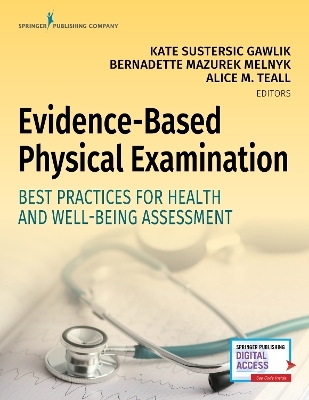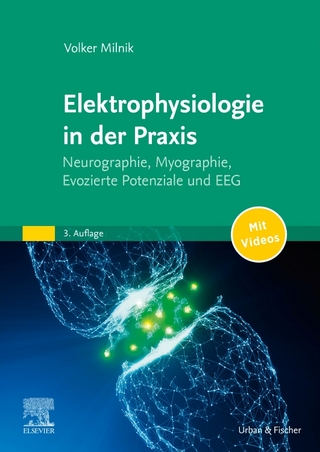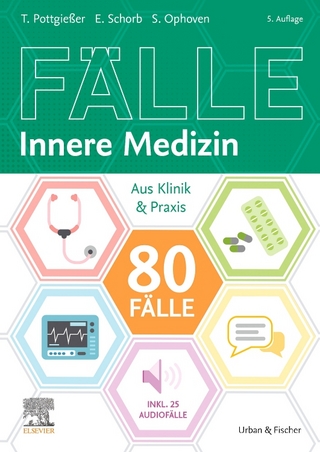
Evidence-Based Physical Examination
Springer Publishing Co Inc (Verlag)
978-0-8261-6453-7 (ISBN)
The first book to teach physical assessment techniques based on evidence and clinical relevance.
Grounded in an empirical approach to history-taking and physical assessment techniques, this text for advanced health care providers and students focuses on patient well-being and health promotion. It is based on an analysis of current evidence and up-to-date guidelines and recommendations and underscores the evidence, acceptability, and clinical relevance behind physical assessment techniques.Evidence-Based Health and Well-Being Assessment offers the unique perspective of teaching both a holistic and scientific approach to assessment. Chapters are consistently structured for ease of use to include anatomy and physiology, key history questions and considerations, physical examination, laboratory considerations, imaging considerations, evidence-based practice recommendations, and differential diagnoses related to normal and abnormal findings. Case studies, clinical pearls, and key takeaways aid retention and countless illustrations, images, and videos demonstrate advanced history-taking and assessment techniques. Instructor resources include PowerPoint slides, test bank with multiple-choice questions, essay questions, and an image bank. This is the physical assessment text of the future.
Key Features:
Delivers the evidence, acceptability, and clinical relevance behind advanced history-taking and assessment techniques
Eschews "traditional" techniques that do not demonstrate evidence-based reliability
Focuses on the most current clinical guidelines and recommendations from resources such as the US Preventative Services Task Force
Focuses on the use of modern technology for assessment
Aids retention through case studies, clinical pearls, and key takeaways
Demonstrates advanced techniques with countless illustrations, images, and videos
Includes robust instructor resources— PowerPoint slides, test bank with multiple-choice questions, essay questions, and an image bank
Purchase includes access to the eBook for use on most mobile devices or computers
Bernadette Mazurek Melnyk, Ph.D., APRN-CNP, FAANP, FNAP, FAAN is the Vice President for Health Promotion, University Chief Wellness Officer, and Professor and Dean of the College of Nursing at The Ohio State University. She also is a Professor of Pediatrics and Psychiatry at Ohio State's College of Medicine. In addition, she is the Executive Director of the Helene Fuld Health Trust National Institute for Evidence-based Practice in Nursing and Healthcare. Dr. Melnyk earned her bachelor of science in nursing degree from West Virginia University, her master of science degree with a specialization in nursing care of children and pediatric nurse practitioner from the University of Pittsburgh, and her PhD in clinical research from the University of Rochester, where she also completed her post-master's certificate as a psychiatric mental health nurse practitioner. She is a nationally/internationally recognized expert in evidence-based practice, intervention research, child and adolescent mental health, and health and wellness, and is a frequent keynote speaker at national and international conferences on these topics. Dr. Melnyk has consulted with hundreds of healthcare systems and colleges throughout the nation and globe on how to improve quality of care and patient outcomes through implementing and sustaining evidence-based practice. Her record includes over $33 million of sponsored funding from federal agencies and foundations as principal investigator and over 390 publications. Dr. Melnyk is coeditor of six other books, including Implementing the Evidence-Based Practice (EBP) Competencies in Healthcare: A Practical Guide for Improving Quality, Safety, and Outcomes; Evidence-Based Practice in Nursing & Healthcare: A Guide to Best Practice (Fourth Edition), an American Journal of Nursing Research Book of the Year Award winner; Implementing EBP: Real World Success Stories; A Practical Guide to Child and Adolescent Mental Health Screening, Early Intervention and Health Promotion (Second Edition); Intervention Research and Evidence-Based Quality Improvement: Designing, Conducting, Analyzing and Funding (Second Edition), also an American Journal of Nursing Research Book of the Year Award winner, and Evidence-Based Health and Well-Being Assessment. A Guide to Best Practice. Dr. Melnyk is an elected fellow of the National Academy of Medicine, the American Academy of Nursing, the National Academies of Practice, and the American Association of Nurse Practitioners. She served a 4-year term on the 16-member United States Preventive Services Task Force and the National Institutes of Health's National Advisory Council for Nursing Research and was a board member of the National Guideline Clearinghouse and the National Quality Measures Clearinghouse (NGC/NQMC). She currently serves as a member of the National Quality Forum's (NQF) Behavioral Health Standing Committee. Dr. Melnyk also serves as editor of the journal Worldviews on Evidence-Based Nursing and is a member of the National Academy of Medicine's Action Collaborative on Clinician Well-Being and Resilience as well as an elected board member for the National Forum for Heart Disease & Stroke Prevention. Dr. Melnyk has received numerous national and international awards, including the Audrey Hepburn Award; Mary Tolle Wright Excellence in Leadership Award; and the International Nursing Research Hall of Fame Award from Sigma Theta Tau International; the Jessie Scott Award from the American Nurses Association for the improvement of healthcare quality through the integration of research, education and practice; the 2012 Midwest Nursing Research Society Senior Scientist award; the NIH/National Institute of Nursing Research's inaugural director's lectureship award; the American Association of Nurse Practitioners (AANP) Sharp Cutting Edge Award, and the National Organization of Nurse Practitioner Faculties Lifetime Achievement Award. She has been recognized as an Edge Runner three times by the American Academy of Nursing for founding and directing the National Association of Pediatric Nurse Practitioners' KySS child and adolescent mental health program, her Creating Opportunities for Personal Empowerment (COPE) program for parents of critically ill children and preterm infants, and her COPE cognitive behavioral skills-building program for depressed and anxious children, teens, and college students, which is being implemented in 44 states throughout the United States and five countries. She is also the founder of two companies that disseminate her evidence-based intervention programs. Dr. Melnyk founded the National Interprofessional Education and Practice Collaborative to advance the Department of Health and Human Services' Million Hearts® initiative to prevent 1 million heart attacks and strokes, which is a collaboration of over 150 organizations and academic institutions across the United States. She also created and chaired the first three National Summits on Building Healthy Academic Communities and is the founder and the current President of the National Consortium for Building Healthy Academic Communities, a collaborative organization to improve population health in the nation's institutions of higher learning, and also served as its first president.
Contributors
Preface
Acknowledgments
List of Videos
Instructor Resources
PART I: FOUNDATIONS OF CLINICAL PRACTICE
1. APPROACH TO EVIDENCE-BASED ASSESSMENT OF HEALTH AND WELL-BEING
2. EVIDENCE-BASED HISTORY-TAKING APPROACH FOR WELLNESS EXAMS, EPISODIC VISITS, AND CHRONIC CARE MANAGEMENT
3. APPROACH TO IMPLEMENTING AND DOCUMENTING PATIENT-CENTERED, CULTURALLY SENSITIVE EVIDENCE-BASED ASSESSMENT
4. EVIDENCE-BASED ASSESSMENT OF CHILDREN AND ADOLESCENTS
5. APPROACH TO THE PHYSICAL EXAMINATION: GENERAL SURVEY AND ASSESSMENT OF VITAL SIGNSPART II: EVIDENCE-BASED PHYSICAL EXAMINATION AND ASSESSMENT OF BODY SYSTEMS
6. EVIDENCE-BASED ASSESSMENT OF THE HEART AND CIRCULATORY SYSTEM
7. EVIDENCE-BASED ASSESSMENT OF THE LUNGS AND RESPIRATORY SYSTEM
8. APPROACH TO EVIDENCE-BASED ASSESSMENT OF BODY HABITUS (HEIGHT, WEIGHT, BODY MASS INDEX, NUTRITION)
9. EVIDENCE-BASED ASSESSMENT OF SKIN, HAIR, AND NAILS
10. EVIDENCE-BASED ASSESSMENT OF THE LYMPHATIC SYSTEM
11. EVIDENCE-BASED ASSESSMENT OF THE HEAD AND NECK
12. EVIDENCE-BASED ASSESSMENT OF THE EYE
13. EVIDENCE-BASED ASSESSMENT OF THE EARS, NOSE, AND THROAT
14. EVIDENCE-BASED ASSESSMENT OF THE NERVOUS SYSTEM
15. EVIDENCE-BASED ASSESSMENT OF THE MUSCULOSKELETAL SYSTEM
16. EVIDENCE-BASED ASSESSMENT OF THE ABDOMINAL, GASTROINTESTINAL, AND UROLOGICAL SYSTEMS
PART III: EVIDENCE-BASED PHYSICAL EXAMINATION AND ASSESSMENT OF SEXUAL AND REPRODUCTIVE HEALTH
17. EVIDENCE-BASED ASSESSMENT OF THE BREASTS AND AXILLAE
18. EVIDENCE-BASED ASSESSMENT OF SEXUAL ORIENTATION, GENDER IDENTITY, AND HEALTH
19. EVIDENCE-BASED ASSESSMENT OF MALE GENITALIA, PROSTATE, RECTUM, AND ANUS
20. EVIDENCE-BASED ASSESSMENT OF THE FEMALE GENITOURINARY SYSTEM
21. EVIDENCE-BASED OBSTETRIC ASSESSMENT
PART IV: EVIDENCE-BASED PHYSICAL EXAMINATION AND ASSESSMENT OF MENTAL HEALTH
22. EVIDENCE-BASED ASSESSMENT OF MENTAL HEALTH
23. EVIDENCE-BASED ASSESSMENT OF SUBSTANCE USE DISORDER
24. EVIDENCE-BASED ASSESSMENT AND SCREENING FOR TRAUMATIC EXPERIENCES: ABUSE, NEGLECT, AND INTIMATE PARTNER VIOLENCE
25. EVIDENCE-BASED THERAPEUTIC COMMUNICATION AND MOTIVATIONAL INTERVIEWING IN HEALTH ASSESSMENT
PART V: SPECIAL TOPICS IN EVIDENCE-BASED ASSESSMENT
26. EVIDENCE-BASED HISTORY AND PHYSICAL EXAMINATIONS FOR SPORTS PARTICIPATION EVALUATION
27. USING HEALTH TECHNOLOGY IN EVIDENCE-BASED ASSESSMENT
28. EVIDENCE-BASED ASSESSMENT OF PERSONAL HEALTH AND WELL-BEING FOR CLINICIANS: KEY STRATEGIES TO ACHIEVE OPTIMAL WELLNESS
29. EVIDENCE-BASED HEALTH AND WELL-BEING ASSESSMENT: PUTTING IT ALL TOGETHER
| Erscheinungsdatum | 02.12.2019 |
|---|---|
| Verlagsort | New York |
| Sprache | englisch |
| Maße | 152 x 229 mm |
| Gewicht | 2177 g |
| Themenwelt | Medizin / Pharmazie ► Pflege ► Ausbildung / Prüfung |
| Studium ► 2. Studienabschnitt (Klinik) ► Anamnese / Körperliche Untersuchung | |
| Studium ► Querschnittsbereiche ► Prävention / Gesundheitsförderung | |
| ISBN-10 | 0-8261-6453-6 / 0826164536 |
| ISBN-13 | 978-0-8261-6453-7 / 9780826164537 |
| Zustand | Neuware |
| Informationen gemäß Produktsicherheitsverordnung (GPSR) | |
| Haben Sie eine Frage zum Produkt? |
aus dem Bereich


